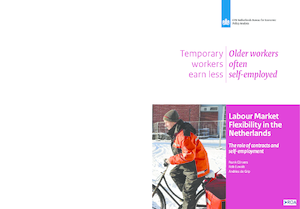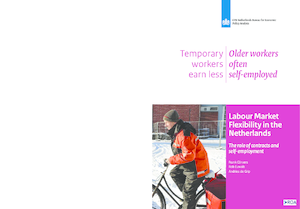Labour Market Flexibility in the Netherlands; The role of contracts and self-employment
Flexibele arbeid belangrijk voor de arbeidsmarkt
We are sorry, unfortunately there is no English translation of this page.
This study focuses on the role of the most important types of labour relations that are observed on the Dutch labour market: permanent contracts, temporary contracts and self-employment. The five chapters in this study provide new empirical evidence on individual labour market outcomes in the most recent period in the Netherlands.
The evidence shows that wages in the Netherlands increase strongly with tenure (chapter 3), that temporary workers earn less and are more often overeducated for the work they do (chapter 4), that temporary workers receive less employer-funded training (chapter 5), that temporary jobs can act as a steppingstone for certain kinds of workers, such as highly educated individuals (chapter 6), and that self-employment can act as a steppingstone for certain groups, as well (chapter 7). The evidence is nested in a conceptual framework that discusses the advantages and disadvantages of labour market flexibility for both workers and firms.
An overall conclusion is that the coexistence of different types of labour contracts makes sense, since they serve different goals on the labour market.
The study provided input for the conference 'Flexibility of the Labour Market', which was held on 20-21 January 2011 in the Hague.
The program, papers and presentations can be found here.


